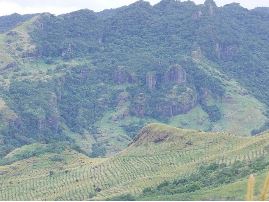Fiji's Forest Policy
A new forest policy for Fiji was endorsed by Cabinet in November 2007, replacing the existing forest policy, which dated from 1950.
The policy review and formulation process began in 2003 when, in response to a request from Fiji’s Forestry Department, LRD, with the support of GTZ (German Technical Cooperation), agreed to provide the technical and funding assistance required.
Given the changes that have taken place since the 1950s, a review was necessary to ensure that the policy adequately addressed the changing demands on Fiji’s forests, in terms of balancing the country’s economic, social and environmental needs. It also needed to address Fiji’s obligations under the various international agreements and conventions that it has signed. Lastly, but most importantly, the new policy had to be more broad-based than the 1950 policy.
To a great extent, the new forest policy satisfies these needs. Its main thrusts are as follows:
- Change from forest sector planning to integrated natural resources management
- Transition from timber exploitation to sustainable forest management
- Empowerment of land owners to adopt sustainable management practices
The greatest challenge will be the implementation of the policy on the ground. But the fact that it went through a lengthy consultation process before its finalisation means that the new policy is a much more widely understood and supported document, and therefore, more broad-based in its ownership than the previous policy, which should greatly assist its implementation.
Currently, a new set of forestry legislation is being formulated to replace the existing Forest Decree 1992. This is necessary to align the legislation with the new forest policy and also to take into consideration recently approved legislation, such as that relating to environmental management. This work is expected to be completed by the end of 2009. Tonga's Forest Policy The United Nations Food and Agriculture Organisation (FAO) has been helping Tonga to review and update its forest policy.
The policy development process has enabled all stakeholders in Tonga to feed in their views on how Tonga’s forest resources should be managed. The development of an overarching forest policy was considered important to set out an agreed basis for managing forest resources, to outline how this should happen and to underpin any subsequent legislation.
The draft forest policy emphasises the sustainable management of forest resources and the important role that forests play in biodiversity and soil conservation, coastal protection, water management and climate change adaptation and mitigation. As part of the extensive consultation undertaken in developing the draft policy, FAO, with the support of GTZ through its project ‘Adaptation to Climate Change in the Pacific Island Region’, conducted a stakeholder workshop on integrating climate change considerations into the draft policy.
The expansion of agriculture into forested areas was identified as one of the biggest threats to Tongan forests and implementation of the forest policy depends on a commitment to sustainable agriculture. Currently, there are no overall land use or agriculture policies in Tonga and it is hoped that the development of a national forest policy will lay the foundation for developing these policies.





CONNECT WITH US